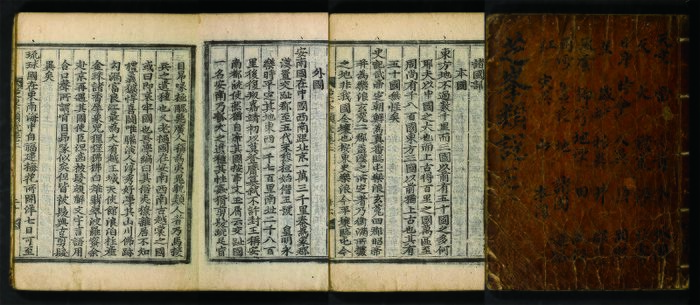|
|
| 310번째 줄: |
310번째 줄: |
| | | | |
| | | | |
| − | 29. 土魯番。在火州西百里。古交河縣。亦曰車師國。氣候多煖少雨雪。土宜麻麥。人皆屋居信佛法。有靈山周二十餘里。悉五色砂石。光焰灼火。四回峻壑。天巧奇絶。草木不生。禽獸鮮少。蓋佛書所稱靈山是也。 | + | 29. 土魯番。在火州西百里。古交河縣。亦曰車師國。氣候多煖少雨雪。土宜麻麥。人皆屋居信佛法。有靈山周二十餘里。悉五色砂石。光焰灼火。四回峻壑。天巧奇絶<sup7></sup>。草木不生。禽獸鮮少。蓋佛書所稱靈山是也。 |
| | | | |
| − | Turpan<sup>1</sup> is 100 li away in the West from Huozhou<sup>2</sup>. It belongs to the ancient {{Jiaohe}}<sup>4</sup>. It is also called the Jushi Kingdom<sup>5</sup>. Its climate is very warm and it rains and snows only a little. The local products are sesame and wheat. People [there] all live in houses and believe in Buddhism. The area extends over more than 20 li. The whole five colors<sup>6</sup> are sand and stones. | + | Turpan<sup>1</sup> is 100 li away in the West from Huozhou<sup>2</sup>. It belongs to the ancient {{Jiaohe}}<sup>4</sup>. It is also called the Jushi Kingdom<sup>5</sup>. Its climate is very warm and it rains and snows only a little. The local products are sesame and wheat. People [there] all live in houses and believe in Buddhism. The area extends over more than 20 li. The whole five colors<sup>6</sup> are sand and stones. The light flare, the fire burns. There are four deep gullies. The sky is incredibly wonderful.((ref?)) The grass and trees do not grow. The birds and beasts are very few. There are Buddhist scripts praising the spirits in the mountain. |
| | | | |
| | | | |
| 335번째 줄: |
335번째 줄: |
| | | | |
| | <sup>6</sup> 五色: it can be metaphorically understood here as 'the environment' or 'the view'. | | <sup>6</sup> 五色: it can be metaphorically understood here as 'the environment' or 'the view'. |
| | + | |
| | + | <sup>7</sup>: Interestingly, this passage looks familiar to the one of the 历代兴衰演义, written about a century later by Lǚ Fǔ (吕撫): "群山悉五色,砂石光焰灼人,峻壑穷崖,天巧奇绝。" |
| | | | |
| | | | |
2018년 7월 8일 (일) 19:43 판
Introduction
Original Script
| Image |
Text |
Translation
|
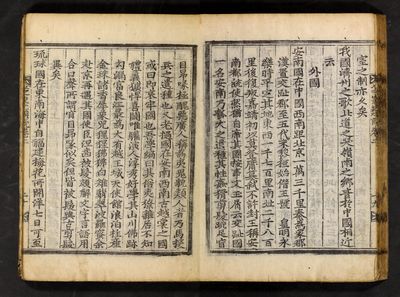
|
1. 安南國在中國西南。距北京一萬三千里。秦爲象郡。漢置交趾郡。至五代末。黎桓始僭王號。皇明永樂時。平定其地。東西一千七百里。南北二千八百里。後復叛。嘉靖初。以莫登庸纂弑。不許封王。稱安南都統使。然猶自帝其國。按事文玉屑云交趾國一名安南。乃瓠犬之遺種。其性姦猾。剪髮跣足。窅目昂喙。極醜惡。廣人稱爲夷鬼貌類人者。乃馬援兵之遺種也。又老撾國在安南西南。古越裳之國。或曰卽哀牢國也。吾學編曰。其俗夷獠雜居。不知禮義。獷悍喜鬪。唯驩演人淳秀好學。其山川佛跡,句漏,富良江最爲大。有越王城,天使館,浪泊柱。産金,珠,諸,香,犀,象,兕,猩猩,狒狒,白雉,翡翠,波羅蜜,余赴京。再遇其國使臣。涅齒被髮。頗解文字。言語用合口聲。所謂窅目昂喙似矣。但皆被髮。與古剪髮異矣。
2. 琉球國在東南海中。自福建梅花所開洋。七日可至。"
|
(translation)
|
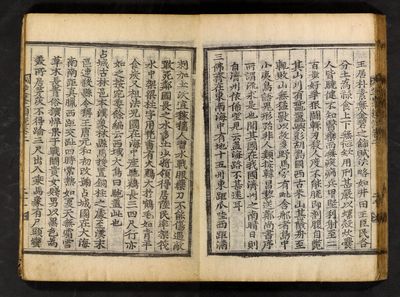
|
王居朴素。無金碧之飾。賦法略如井田。王臣民各分土爲祿食。上下無征斂。用刑甚嚴。以螺殼炊爨。人皆驍健。不知醫藥而無疾病。兵甲堅利。射至二百步。好爭狼鬪。輒刃殺人。度不能脫。卽剖腹自斃。其山川有黿鼉嶼,彭胡島。國西古米山甚險。舟至輒敗。山無猛獸。以故多野馬。旁有毗舍那者。島中小夷。鳥語鬼形。殆非人類。按韓昌黎送鄭尚書序所謂流求是也。聞其國在我國濟州之南。晴日則自濟州依俙望見云。蓋海路不甚遠耳。
3. 三佛齊在東南海中。有地十五州。東距爪哇。西距滿剌加。土沃宜稼穡。人習水戰。服藥刀不能傷。遇敵敢死。隣國畏之。水多土少。將領得居陸。民率架筏。水中架梁柱。字用梵書。有火鷄大於鶴。毛如靑羊食炭。又祖法兒國在海中。産駞鷄長三四尺。行亦如之。按宛委餘編云西域大鳥曰駞。蓋此也。
4. 占城古林邑。本漢象林縣。馬援置銅柱之處。至漢末。區連殺縣令稱王。唐元和初。改號占城國。在大海南。南距眞臘。西距交趾。四時常熱如夏天。無霜雪。草木長靑。俗獷悍。果于戰鬪。貴女賤男。以黑色爲美。所居茅茨。不得踰三尺。出入乘馬象。有尸頭蠻"
|
(translation)
|
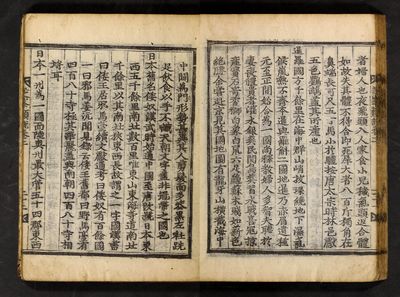
|
者。婦人也。夜飛頭入人家。食小兒穢氣。頭返合體如故。失其體不得合卽死。犀大者八百斤。獨角在鼻端。長可尺五寸。馬小於驢。按唐太宗時。林邑獻五色鸚鵡。蓋其所産也。
5. 暹羅國方千餘里。在海中。群山峭拔環繞。地下濕。氣候嵐熱不齊。本暹與羅斛二國地。暹乃赤眉遺種。元至正間。始合爲一國。尚釋敎。婦人多智。夫聽於妻。喪禮。貴者灌水銀葬。民間鳥葬。習水戰喜寇掠。産寶石,奇香,獅,白象,白鼠,六足龜。蘇木賤如薪色絶勝。余甞赴京。見其國地圖。有龍牙山橫截海中。中闢爲門。形勢甚異。其人剪髮。面多漆黑。左衽跣足。飮食以手。不識天朝文字。蓋非冠帶之國也。
6. 日本舊名倭奴。漢武時始通中國。至唐改號日本。東西五千餘里。南北數百里。唯東山東海等道。南北千餘里。以其南北狹東西長。故謂之一字國。漢書曰。倭王居邪馬臺。續文獻通考曰。倭奴有百餘國。一曰邪馬。姜沆聞見錄云倭王舊都曰野馬臺。有四百八十寺。極其華麗。蓋與南朝四百八十寺相埒耳。
7. 日本一州爲一國。而陸奧州最大。管五十四郡。東西"
|
(translation)
|
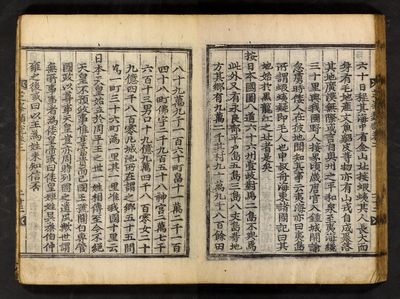
|
六十日程。其海中有金山。北接蝦蛦。其人長大而身有毛。地産文魚貂皮等物。亦有山戎自成聚落。其地廣漠無際。或言自奧州之平和泉。至夷海纔三十里。與我國野人接界。頃歲唐官入鍾城。開諭忽虜時。倭人在彼地。聞知其事云。夷海亦曰夷島。所謂蝦蛦。疑卽毛人也。申叔舟海東諸國記曰。其地始於黑龍江之北者是矣。
8. 按日本國圖。八道六十六州。壹岐,對馬二島不與焉。此外又有永良部,平戶島,五島,三島,八丈島等地方。其鄕有九萬二千。其村九十萬九千八百餘。田八十九萬九千一百六十町。畠十一萬二千一百四十八町。佛宇二千九百五十八。神宮二萬七千六百十三。男口十九億九萬四千八百零。女二十九億四千八百零。凡城池所在。謂之鄕。五十五間爲一町。三十六町爲一里。其一里准我國十里云。
9. 日本天皇。始立於周平王之世。一姓相傳。至今不絶。天皇不預政事。惟享富貴而已。國王號關白。專管國政。以尊事天皇。豈亦周時列國之遺風歟。世謂無所事事者。爲倭皇帝。或曰倭皇姬姓。吳泰伯仲雍之後。或曰以王爲姓。未知信否。"
|
(translation)
|
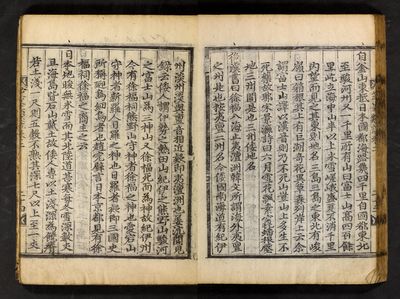
|
10. 自釜山東抵日本國都。海路幾四千里。自國都東北至駿河州。又一千里。所有山曰富士山。高四百餘里。屹立海中。山半以上。冰雪嵯峨。盛夏不消。千里內望而見之。其東則地名三島。三島之東北。有峻嶺曰箱根。其上有巨湖。奇花異草森列岸上云。余謂富士山。譯以漢音。則乃不死山。豈山上多生不死藥故耶。宋景濂詩曰六月雪花飄素竁。蟠根壓地三州間是也。三州。倭地名。
11. 後漢書曰。徐福入海。止夷澶洲。韓文所謂海外夷亶之州是也。按夷亶二州名。今倭國南海道。有紀伊州淡州。淡與亶音相近。疑卽夷澶洲也。姜沆聞見錄云倭人謂伊勢之熱田山。紀伊之熊野山。駿河之富士山。爲三神山。又徐福死而爲神。故紀伊州。今有徐福祠。熊野山守神者。徐福之神也。愛宕山守神者。新羅人日羅之神也。日羅者。疑卽三國史所稱迎烏,細烏者也。趙完璧言日本京都。見有徐福祠。徐福之裔主之云。
12. 日本地暖無冰雪。而其北陸道甚寒。每冬雪深數丈。且海島皆石山戴土。故倭人專以土淺深爲饒瘠。若土淺一尺。則五穀不熟。其深七尺以上至一丈"
|
(translation)
|
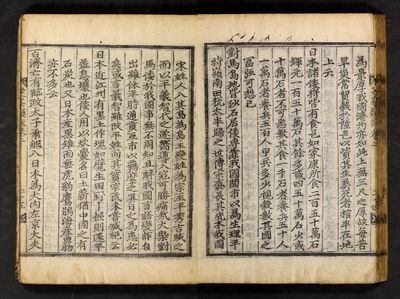
|
爲最厚。我國濟州亦如此。土無三尺之厚。故每苦旱災。常貿穀於陸邑。以資其生。葬死者。棺半在地上云。
13. 日本諸倭將。皆有食邑。如家康所食。二百五十萬石。輝元。一百五十萬石。其餘。多或四五十萬石。少或十萬石者。不可悉數。其食一千石者。養兵五十人。一萬石者。養兵五百人。甲兵多少視穀數。其國之富强可想已。
14. 對馬島地皆沙石。居倭專靠我國開市。以爲生理。平時嶺南田稅。太半歸之。世傳宗盛長。其先本我國宋姓人。入其島爲島主。變姓爲宗。至平秀吉滅之。而以平義智代之。遂嚮導入寇。可勝痛哉。大槪對馬倭。於我國事。無不周知。且解我國言語。變詐百出。雖依平時通貢互市。以羈縻之。異日之爲患必矣。或言義智雖改平姓。而其實宗氏未嘗滅絶云。
15. 日本近江州。有黑土作塊如甓。生田野中。掘則還平。蓋息壤也。倭人用以炊爨。名曰土薪。猶中國之有石炭也。又日本産黑雉而無虎豹鷹鵲。海産魚物。亦不多云。
16 . 百濟亡。有臨政太子乘船入日本。爲大內左京大夫。"
|
(translation)
|
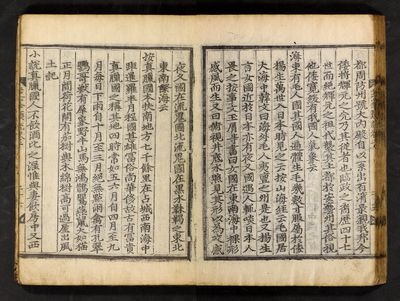
|
都周防州。號大內殿。自以系出百濟。最親我邦。今倭將輝元之先。乃其從者也。臨政之裔。歷四十七世而絶。輝元之祖。代襲其土。都於安藝州。其俗視他倭寬緩。有我國人氣象云。
17. 海東有毛人國。其國人遍體生毛幾數寸。服屬於倭。楊生萬世入日本時見之云。按山海經云毛國居大海中。韓文曰海外毛人夷亶之州是也。又楊生言女國近於日本。亦有夜叉國。遇人輒啖。日本人畏之。按事文玉屑等書曰。女國在東南海中。裸形感風而生。又曰俯視井底水。照見其形。以爲交感。夜叉國在流鬼國北。流鬼國在黑水靺鞨之東北。東南際海云。
18. 按眞臘國本扶南。地方七千餘里。在占城西南海中。距暹羅半月程。國甚雄富。俗尚華侈。故古有富貴眞臘國之稱。其地四時常如五六月。自四月至九月。每日下雨。自十月至三月。絶無點雨。禽有孔翠鸚哥。獸有犀象野牛山馬。無鴻鵲鶯燕。鼠大如猫。正月間荷花開。有茄樹與木綿樹。高可過屋。出風土記。
19. 小說。眞臘國人。不飮酒比之淫。惟與妻飮房中。又西"
|
(translation)
|
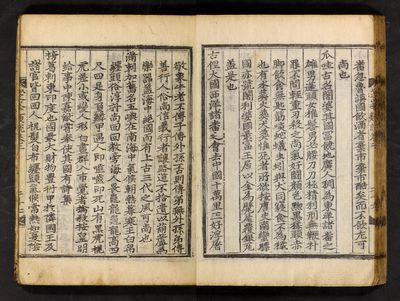
|
番忽魯謨國。飮酒者棄市。棄市酷矣。而不飮。尤可尚也。
20. 爪哇。古名闍婆其國富饒。地廣人稠。爲東洋諸番之雄。男蓬頭女椎髻。男必腰刀。刀極精利。刑無鞭朴。罪不問輕重。刃殺之。尚氣好鬪。顔色黝黑。猱頭赤脚。飮食無匙筯。啖蛇蟻蟲蚓。與犬同寢食。不爲穢也。有水葬火葬犬葬。惟死者所欲。按唐史。南蠻驃國。亦號闍利婆。國最富。王居以金爲甓。屋覆銀瓦蓋是也。
21. 古俚大國。西洋諸番之會。去中國十萬里。王好浮屠。敬象牛。老不傳子。傳外孫。否則傳弟。無外孫弟。傳善行人。俗尚信義。行者讓路。道不拾遺。以葫蘆爲樂器。蓋海中絶國。而有上古三代之風。可尚也。
22. 滿剌加。舊名五嶼。在南海中。氣候朝熱暮寒。王白帛纏頭。俗淳朴。尚回回敎。旁海人畏龜龍。龜龍高四尺四足。身負鱗甲。遇人卽嚙。嚙卽死。山有黑虎。視虎差小。或變人形。白晝群入市。覺者擒殺。按皇明給事中陳嘉猷。嘗奉使其國。有詩集。
23. 榜葛剌。東印度也。國最大。財物豐衍。甲於隣國。王及諸官。皆回回人。祝髮白布纏頭。氣候常熱如夏。陰"
|
(translation)
|
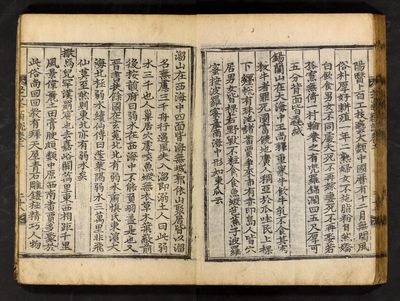
|
陽醫卜百工技藝。大類中國。曆有十二月無閏。風俗朴厚。好耕殖。一年二熟。婦女不施脂粉。自然嬌白。飮食。男女不同處。夫死不再嫁。妻死不再娶。若孤寡無倚。一村輪養之。有兜羅錦。闊四五尺。厚可五分。背面皆毳絨。
24. 錫蘭山在大海中。王尚釋重象牛。飮牛乳不食其肉。殺牛者罪死。國富饒。地廣人稠。亞於爪哇。民上裸下纏帨。有珠池。諸番賈爭來市。有赤印島。人皆穴居。男女皆裸若野獸。不粒食。食魚蝦芭蕉子波羅蜜。按波羅蜜産南海中。形如東瓜云。
25. 溜山在西海中。四面皆海。無城郭。依山聚居。皆以溜名。無慮三千。舟行遇風失入溜卽溺。土人曰此弱水三千也。人巢居穴處。啖魚蝦無衣。草木葉蔽前後。按韻府曰。弱水在西海中。不能負羽。蓋是也。又晉書。扶餘國在玄菟北。北有弱水。肅愼氏東濱大海。北極弱水。續仙傳曰。蓬萊隔弱水三萬里。非飛仙莫至。然則東北亦有弱水矣。
26. 撒馬兒罕。漢罽賓也。去嘉峪關萬里。東西相距千里。風景偉麗。土田膏腴。頗類中原。西南番賈多聚於此。俗尚回回敎。有拜天屋。靑石雕鏤極精巧。人物"
|
(translation)
|
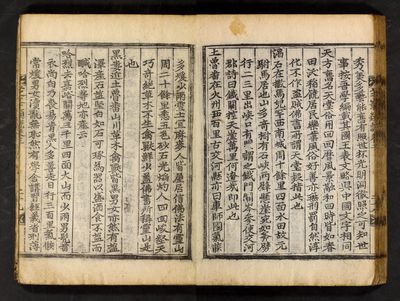
|
秀美多藝能。舊有照世杯。光明洞徹。照之可知世事。按吾學編。載其國王表文。略與中國文字相同。
27. 天方。舊名天堂。俗用回回曆。風景融和。四時皆如春。田沃稻饒。居民樂業。風俗好善。亦無刑罰。自然淳化。不作盜賊。佛書所謂天堂。疑指此也。
28. 渴石。在撒馬兒罕西南。城周十餘里。四面水田。故元駙馬居也。山多奇樹。有石峽。兩壁懸崖。宛如斧劈。行二三里。出峽口有門。謂之鐵門關。岑參使交河郡詩曰。鐵關控天崖。萬里何遼哉。卽此也。
29. 土魯番。在火州西百里。古交河縣。亦曰車師國。氣候多煖少雨雪。土宜麻麥。人皆屋居信佛法。有靈山周二十餘里。悉五色砂石。光焰灼火。四回峻壑。天巧奇絶。草木不生。禽獸鮮少。蓋佛書所稱靈山是也。
30. 黑婁。近土魯番。山川草木禽獸皆黑。男女亦然。有鹽澤産石鹽。堅白如石。可琢爲器。以盛酒食。不鹽而鹹。哈烈等地亦産云。
31. 哈烈。去嘉峪關萬三千里。四面大山而少雨。男髡首。衣尚白。乃喪易靑黑。人多善走。日行三百里。氣候常煖。男女瀆亂無恥。然有學舍。講習經義。省刑薄"
|
(translation)
|
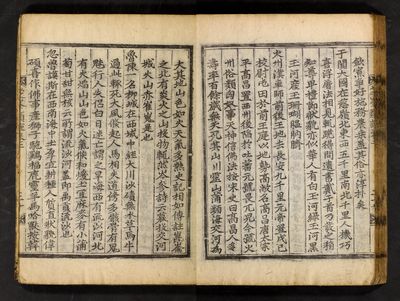
|
斂。寡爭好施。務農桑。蓋其俗亦淳朴矣。
32. 于闐大國。在葱嶺北。東西五千里。南北千里。人機巧。喜浮屠法。相見輒跪。得問遺書。戴于首乃發之。稍知尊卑禮節。狀貌亦似華人。有白玉河,綠玉河,黑玉河。産玉珊瑚膃肭臍。
33. 火州。漢車師前後王地。去長安九千里。元帝置戊己校尉。屯田於前王庭。以地勢高敞。名高昌。唐太宗平高昌置西州。後陷於吐蕃。元號畏兀兒。今號火州。俗類匈奴。事天神信佛法。按宋史曰。高昌人多壽。率百餘歲。無夭死。其山川。靈山,蒲類海,交河爲大。其地山色如火。天氣多熱。史記相如傳註。崑崙之北。有炎火之山。投物輒然。岑參詩云暮投交河城。火山赤崔嵬是也。
34. 魯陳。一名柳城。在西域中。經大川沙磧無水草。馬牛過此輒死。大風倏起。人馬相失。道傍多骸骨有鬼魅。行人失侶。白日迷亡。謂之旱海。西有流沙河。北有火焰山。山色如火。氣候和煖。土宜麻麥。有小蒲萄。甘甜無核云。所謂流沙河。蓋卽禹貢流沙也。
35. 忽魯謨斯。在西南海中。土厚宜耕種。人質直。狀貌偉碩。喜作佛事。産獅子駞鷄福鹿靈羊馬哈獸。按韓"
|
(translation)
|
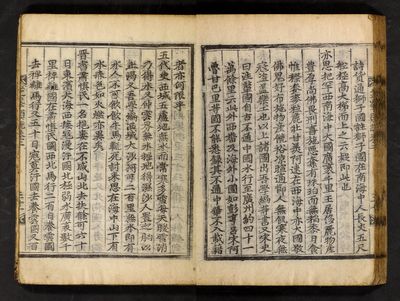
|
詩貨通獅子國註。獅子國在南海中。人長丈五尺。船極高大。梯而上之云。疑卽此也。
36. 亦思把罕。西南海中大國。廣袤千里。王居侈麗。物産豐厚。尚佛畏刑。喜施惡奪。有珠珀而無稻黍。日食惟穄麥。麥粒麤壯甘美。阿速在西海中。亦大國。敬佛鬼好布施。物産饒裕。凉暄適節。人無飢寒。夜無寇盜。蓋樂土也。以上諸國。出吾學編等書。又宋史曰。注輦國。自古不通中國。水行至廣州。約四十一萬餘里云。此外西番及海外小國。如彭亨,呂宋,阿魯甘,巴里等國。不能悉錄。其不通中華。不入載籍者。亦何限乎。
37. 五代史。西域五盧地無水。而常寒多雪。每天暖雪消。乃得水。又仲雲界無水。掘地得濕沙。人置之胸以止渴。又吾學編。西域大沙河可二百里無水。卽有水。人不可飮。飮牛馬輒死。討來思在海中。山下有水。赤色如火燃。亦異矣。
38. 晉書。肅愼氏。一名挹婁。在不咸山北。去扶餘可六十日。東濱大海。西接寇漫汗國。北極弱水。廣袤數千里。裨離國。在肅愼氏國西北。馬行二百日。養雲國。去裨離馬行又五十日。寇莫汗國。去養雲國又百"
|
(translation)
|
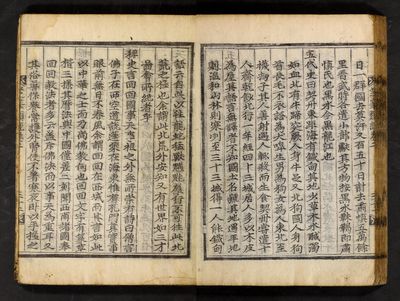
|
日。一群國。去莫汗又百五十日。計去肅愼五萬餘里。晉武時各遣小部。獻其方物。按黑水靺鞨。卽肅愼氏也。黑水。今黑龍江也。
39. 五代史曰。契丹東距海有鐵甸。其地少草木。水鹹濁如血。北有牛蹄突厥。人身牛足。又北狗國。人身狗首。長毛不衣。語爲犬嗥。生男爲狗女爲人。東北至襪劫子。其人善射。遇人輒殺而生食。契丹嘗遣十人。齎乾麨北行一年。經四十三城。居人多以木皮爲屋。其語言無譯者。不知國土名號。其地遇平地則溫和。山林則寒冽。至三十三城。得一人能鐵甸語云。自此以往。龍蛇猛獸魑魅群行。不可往。此北荒之極也。余謂此北荒外。安知又有世界。如三才圖會所紀者乎。
40. 稗史言回回國。事天事祖之外。無所崇。有詩曰僧言佛子在西空。道說蓬萊在海東。惟有孔門眞實事。眼前無日不春風。余謂回回在西域。而其言如此。以中華之士。而乃尚佛敎何也。回回文字。有篆草楷三樣。其曆法與中國僅差二刻。聞西南諸國。奉回回敎法者多云。蓋斥佛法而以事天爲重耳。又其俗善保養。常護外腎。使不着寒。夜臥以手握之"
|
(translation)
|
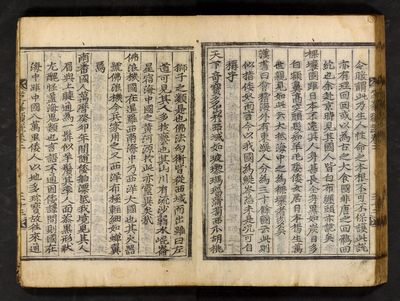
|
令暖。謂此乃生人性命之本根。不可不保護。此說亦有理。回回或以爲古之大食國。非唐之回鶻,回紇也。余赴京時。見其國人。皆白布纏頭。亦詭矣。
41. 裸壤國。距日本不遠。其人身甚長。全身黑如炭。目多白。額鼻高突。頭髮如羊毛。娶倭女居日本。楊生萬世親見如此云。大抵海中之爲裸壤者多矣。
42. 漢書曰。會稽海外。有東鯷人。分爲三十餘國云。此則似指倭奴而言。今以我國爲鯷岑。恐未是。況可自稱乎。
43. 天下奇寶。多出於西域。如玻瓈瑪瑙葡萄西瓜胡桃獅子之類是也。佛法幻術。皆從西域而出。雖曰左道。可見其人多技藝也。其山川。有流沙,弱水,崑崙,星宿海。中國之黃河源於此。亦靈異矣哉。
44. 佛浪機國。在暹羅西南海中。乃西洋大國也。其火器號佛浪機。今兵家用之。又西洋布極輕細。如蟬翼焉。
45. 南番國人。萬曆癸卯年間。隨倭舶漂抵我境。見其人。眉與上睫通爲一。髯似羊鬚。其率人面漆黑。形狀尤醜怪。蓋海鬼類也。言語不通。因倭譯問。則國在海中。距中國八萬里。倭人以地多珍寶。故往來通"
|
(translation)
|
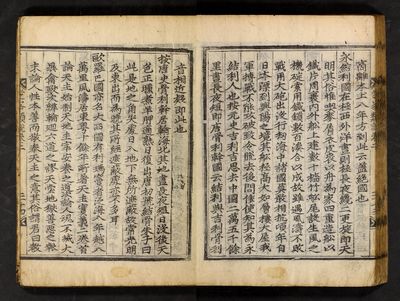
|
商。離本土八年。方到此云。蓋絶國也。
46. 永結利國。在極西外洋。晝則極長。夜纔二更。旋卽天明。其俗惟喫麥屑衣皮裘。以舟爲家。四重造船。以鐵片周裹內外。船上建數十檣竹。船尾設生風之機。碇索用鐵鎖數百湊合以成。故雖遇風濤不敗。戰用大砲。出沒行劫。海中諸國。莫敢相抗。頃年。自日本漂到興陽之境。其船極高大。如層樓大屋。我軍搏戰。不能攻破。致令脫去。後問倭使。知其爲永結利人也。按元史。吉利吉思去中國二萬五千餘里。晝長夜短。卽唐骨利幹國云。結利與吉利骨利音相近。疑卽此也。
47. 按唐史。骨利幹居翰海北。其地晝長夜短。日沒後天色正曛。煮羊胛適熟。日復出。唐初。號結骨。朱子曰。此是地之角尖處。日入地下。無所遮蔽。故常光明。及東出而爲曉。其所經遮蔽處。亦不多耳。
48. 歐羅巴國。亦名大西國。有利瑪竇者。泛海八年。越八萬里風濤。居東粤十餘年。所著天主實義二卷。首論天主始制天地。主宰安養之道。次論人魂不滅。大異禽獸。次辨輪廻六道之謬。天堂地獄善惡之報。末論人性本善而敬奉天主之意。其俗謂君曰敎"
|
(translation)
|
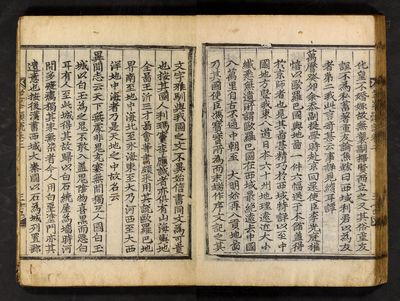
|
化皇。不婚娶故無襲嗣。擇賢而立之。又其俗重友誼。不爲私蓄。著重友論。焦竑曰。西域利君以爲友者第二我。此言奇甚云。事詳見續耳譚。
49. 萬曆癸卯。余忝副提學時。赴京回還使臣李光庭,權憘。以歐羅巴國輿地圖一件六幅送于本館。蓋得於京師者也。見其圖甚精巧。於西域特詳。以至中國地方曁我東八道,日本六十州。地理遠近大小。纖悉無遺。所謂歐羅巴國。在西域最絶遠。去中國八萬里。自古不通中朝。至 大明始再入貢。地圖乃其國使臣馮寶寶所爲。而末端作序文記之。其文字雅馴。與我國之文不異。始信書同文。爲可貴也。按其國人利瑪竇,李應誠者。亦俱有山海輿地全圖。王沂三才圖會等書。頗采用其說。歐羅巴地界。南至地中海。北至冰海。東至大乃河。西至大西洋。地中海者。乃是天地之中故名云。
50. 異聞志云天下無處非鬼充塞無間。獨互人國白玉城。以白玉爲之。鬼不敢入。蓋鬼陰物。喜黑而惡白耳。有人至此城得其故。歸以白石繞屋爲墻。時河間多疫癘。獨其家無染者。今人用白堊塗門。亦其遺意也。按後漢書。西域大秦國。以石爲城。列置郵"
|
(translation)
|
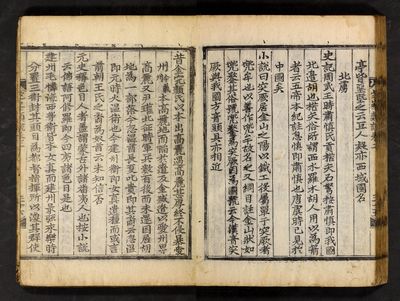
|
亭。皆堊墍之云。互人。疑亦西域國名。
|
(translation)
|
(translation)
Discussion Questions
Further Readings
References
Translation
(sample) : Jaeyoon Song
Student 1 : (Write your name)
Student 2 : (Write your name)
Student 3 : (Write your name)
Student 4 : (Write your name)
Student 5 : (Write your name)
Student 6 : (Write your name)
Student 7 : King Kwong Wong
25. 溜山在西海中。四面皆海。無城郭。依山聚居。皆以溜名。無慮三千。舟行遇風失入溜卽溺。土人曰此弱水三千也。人巢居穴處。啖魚蝦無衣。草木葉蔽前後。按韻府曰。弱水在西海中。不能負羽。蓋是也。又晉書。扶餘國在玄菟北。北有弱水。肅愼氏東濱大海。北極弱水。續仙傳曰。蓬萊隔弱水三萬里。非飛仙莫至。然則東北亦有弱水矣。
26. 撒馬兒罕。漢罽賓也。去嘉峪關萬里。東西相距千里。風景偉麗。土田膏腴。頗類中原。西南番賈多聚於此。俗尚回回敎。有拜天屋。靑石雕鏤極精巧。人物秀美多藝能。舊有照世杯。光明洞徹。照之可知世事。按吾學編。載其國王表文。略與中國文字相同。
27. 天方。舊名天堂。俗用回回曆。風景融和。四時皆如春。田沃稻饒。居民樂業。風俗好善。亦無刑罰。自然淳化。不作盜賊。佛書所謂天堂。疑指此也。
28. 渴石。在撒馬兒罕西南。城周十餘里。四面水田。故元駙馬居也。山多奇樹。有石峽。兩壁懸崖。宛如斧劈。行二三里。出峽口有門。謂之鐵門關。岑參使交河郡詩曰。鐵關控天崖。萬里何遼哉。卽此也。
Student 8 : Younès M'Ghari
29. 土魯番。在火州西百里。古交河縣。亦曰車師國。氣候多煖少雨雪。土宜麻麥。人皆屋居信佛法。有靈山周二十餘里。悉五色砂石。光焰灼火。四回峻壑。天巧奇絶<sup7></sup>。草木不生。禽獸鮮少。蓋佛書所稱靈山是也。
Turpan1 is 100 li away in the West from Huozhou2. It belongs to the ancient 틀:Jiaohe4. It is also called the Jushi Kingdom5. Its climate is very warm and it rains and snows only a little. The local products are sesame and wheat. People [there] all live in houses and believe in Buddhism. The area extends over more than 20 li. The whole five colors6 are sand and stones. The light flare, the fire burns. There are four deep gullies. The sky is incredibly wonderful.((ref?)) The grass and trees do not grow. The birds and beasts are very few. There are Buddhist scripts praising the spirits in the mountain.
30. 黑婁。近土魯番。山川草木禽獸皆黑。男女亦然。有鹽澤産石鹽。堅白如石。可琢爲器。以盛酒食。不鹽而鹹。哈烈等地亦産云。
31. 哈烈。去嘉峪關萬三千里。四面大山而少雨。男髡首。衣尚白。乃喪易靑黑。人多善走。日行三百里。氣候常煖。男女瀆亂無恥。然有學舍。講習經義。省刑薄"斂。寡爭好施。務農桑。蓋其俗亦淳朴矣。
32. 于闐大國。在葱嶺北。東西五千里。南北千里。人機巧。喜浮屠法。相見輒跪。得問遺書。戴于首乃發之。稍知尊卑禮節。狀貌亦似華人。有白玉河,綠玉河,黑玉河。産玉珊瑚膃肭臍。
1 土魯番: sinitic name of Turpan, a city located in modern Xinjiang, China, written as 吐鲁番 in Contemporary Mandarin Chinese (pinyin: Tǔlǔfān; Uyghur: تورپان).
2 火州: one of the designations of the city 高昌 (pinyin: Gāochāng; Uyghur: قاراغوجا) during the Yuan and Ming dynasties.
3 交河: 틀:One of the regions of China located at the East of Beijing.
4 縣: translating it 'county' as in Mandarin Chinese may pose the problem of its important size.
5 車師: the Jushi (pinyin: Jūshī), or Gushi (Mandarin: 姑師; pinyin: Gūshī), were a people who established a kingdom during the 1st millennium BCE in the Turpan basin.
6 五色: it can be metaphorically understood here as 'the environment' or 'the view'.
7: Interestingly, this passage looks familiar to the one of the 历代兴衰演义, written about a century later by Lǚ Fǔ (吕撫): "群山悉五色,砂石光焰灼人,峻壑穷崖,天巧奇绝。"
Student 9 : (Write your name)
Student 10 : (Write your name)
Student 11 : (Write your name)
Student 12 : (Write your name)
Student 13 : (Write your name)
Student 14 : (Write your name)
